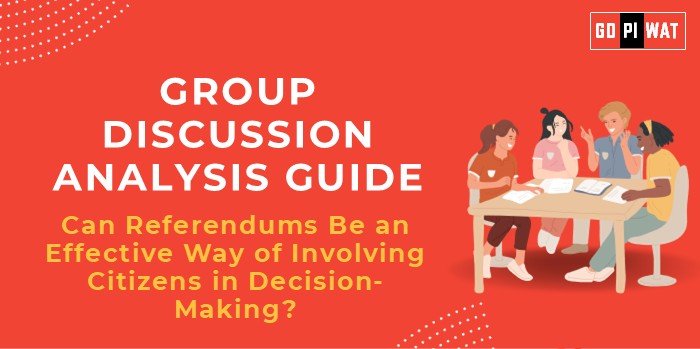📋 Group Discussion Analysis Guide
🌟 Can Referendums Be an Effective Way of Involving Citizens in Decision-Making?
🌐 Introduction to Referendums
Referendums serve as a tool for direct democracy, allowing citizens to vote on critical issues, often bypassing legislative processes. Their use has grown globally, reflecting a desire for greater citizen engagement.
Historically used in Switzerland and other democracies, referendums have shaped major decisions, such as Brexit in the UK and constitutional amendments worldwide. While their potential to reflect public will is undeniable, challenges like misinformation and polarization often accompany them.
📊 Quick Facts and Key Statistics
- 🇨🇭 Switzerland: Holds 3-4 referendums annually, fostering sustained civic engagement.
- 🇬🇧 Brexit Vote (2016): 72.2% voter turnout, showcasing both power and divisiveness.
- 🌍 Global Adoption: Over 100 countries have held referendums on issues like independence and policy reforms.
- 🌐 Digital Democracy: Estonia piloted e-referendums, boosting accessibility and turnout.
👥 Stakeholders and Their Roles
- Governments: Initiate and regulate referendums; ensure fair processes.
- Citizens: Act as primary decision-makers, directly influencing policies.
- Media and Civil Society: Educate and inform voters; act as watchdogs.
- International Observers: Monitor fairness in politically sensitive referendums.
✅ Achievements and ⚠️ Challenges
Achievements:
- 🎉 Empowerment: Enhanced citizen participation in democracies like Switzerland.
- 📊 Policy Validation: Brexit as a tool for gauging public sentiment on divisive issues.
- 💻 Digital Referendums: Estonia’s success in e-governance.
- 🌍 Global Inclusion: Decentralized voices, such as Scotland’s Independence Vote (2014).
Challenges:
- ⚠️ Misinformation: Brexit highlighted how misinformation skews outcomes.
- 🔄 Polarization: Divisive votes can destabilize societies.
- 📉 Low Turnout: Undermines legitimacy, as seen in Colombia’s 2016 peace accord referendum.
🌍 Global Comparisons and Case Studies
- ✅ Success: Switzerland’s sustained use as a cornerstone of governance.
- ❌ Failures: Brexit’s long-term economic and social costs.
- 📚 Case Studies:
- Scotland (2014): 85% turnout for Independence Referendum.
- Colombia (2016): Low turnout of 37% hindered peace referendum legitimacy.
🛠️ Structured Arguments for Discussion
- Supporting Stance: “Referendums are a powerful tool for participatory democracy, ensuring policies resonate with the public.”
- Opposing Stance: “The rise of misinformation and low voter literacy undermine the democratic intent of referendums.”
- Balanced Perspective: “While referendums enhance democracy, their effectiveness hinges on informed electorates and robust mechanisms.”
🎯 Effective Discussion Approaches
- Opening Approaches:
- 📈 Highlight successful referendums like Switzerland’s citizen-centric governance.
- 📉 Use contrasting examples like Brexit’s divisive impact.
- Counter-Argument Handling:
- 💡 Acknowledge issues like misinformation but suggest mitigation strategies like independent fact-checking bodies.
📈 Strategic Analysis of Strengths and Weaknesses
- Strengths: Enhances direct democracy, legitimizes decisions, fosters civic engagement.
- Weaknesses: Risk of polarization, susceptibility to propaganda.
- Opportunities: Digital platforms for secure, widespread voting.
- Threats: Political manipulation, economic instability post-referendums.
📌 Connecting with B-School Applications
- Real-World Applications: Governance innovation projects, civic engagement frameworks.
- Sample Interview Questions:
- “Can referendums replace parliamentary decisions?”
- “Evaluate the economic implications of Brexit.”
- Insights for Students: Importance of data analysis in voter behavior; ethical leadership in public decision-making.


